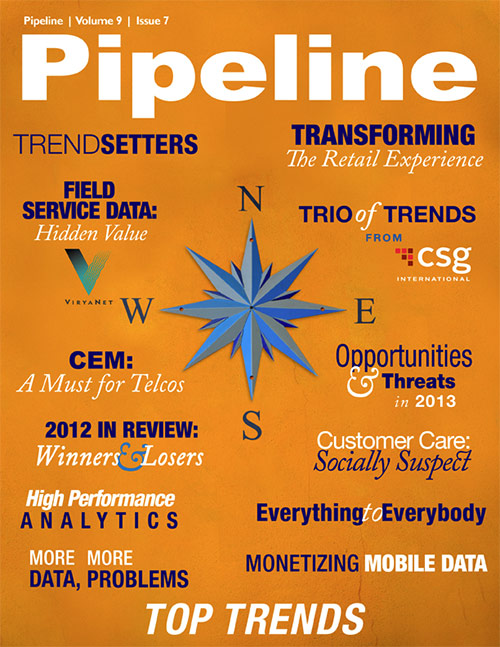Telecommunications Service Providers Make Good on Service Innovation
By: Becky Bracken

This may have been the year that brought about the realization of true service differentiation. More than ever, communications service providers (CSPs) have seemed to figure out how to go
beyond the connectivity of the oft-referenced “dumb pipe” to create innovative, new services that people can’t imagine living without.
The breakneck pace with which these services are being conceived and rolled out is possible because of the incredible strides made in communications and information technology products. Product
collaboration tools from companies such as Tribold have reinvented the way products are created, launched and managed. New, stronger data-security solutions have enabled the storage of medical
records in the cloud. And on-the-fly order management, service fulfillment and sophisticated data-analytics products have become the foundation of the service and customer experience
management.
Below are a few examples of services that were once little more than ambitious ideas but are now a reality and will continue to shape and evolve the way we all live and work.
The connected car
Juniper predicts there will be more than 100 million connected cars on the road by 2016, and ABI Research says Global OEM connected-car-system penetration is expected to increase from 11.4
percent in 2012 to 60.1 percent in 2017. And while much of the connected-car uptake action will be in North America, developing regions such as Latin America and Eastern Europe will see big
gains in telematics, driven largely by mandates in Brazil and Russia.
“In-car connectivity is quickly transforming the automotive industry, enabling passive and active safety and security and offering infotainment and connected lifestyle services to consumers,
but also enabling new car ownership, usage and experience modes such as car sharing, (semi-) autonomous driving, dynamic demand-response electric-vehicle charging pricing, and customer and
vehicle relationship management services including prognostics and preventive maintenance,” says Dominique Bonte, VP and practice director of ABI, adding that the two primary issues the
automotive industry continues to face are cost and lack of awareness.
The connected car offers the opportunity to not only deliver a variety of new services but also monitor and predict a driver’s behavior, opening an entire galaxy of applications opportunities,
from safety and directions to location-based marketing.
KPMG’s market research finds that future customer generations will demand a symbiotic relationship between their cars and IT solutions. Driven by providers like Agero, Airbiquity, Continental,
Harman, Hughes Telematics, and the better-advertised OnStar, the car as an independent connected device is quickly gaining momentum, market force and consumer demand.





















